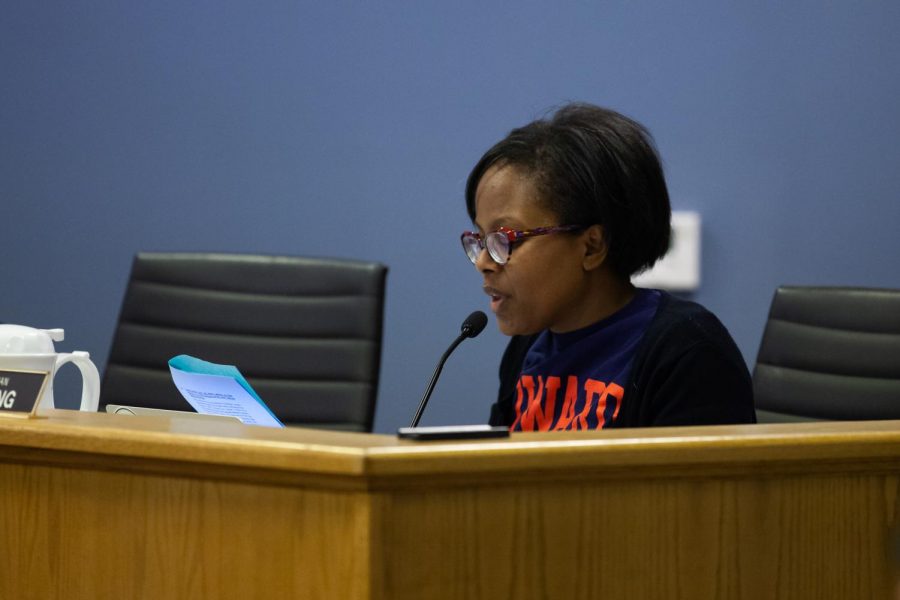City Council passes resolutions, ordinance to support residents during COVID-19
Daily file photo by Joshua Hoffman
Ald. Cicely Fleming (9th). City Council introduced an ordinance to grant emergency powers to the city’s liquor commissioner to alter liquor licenses in an emergency situation, which passed unanimously.
March 18, 2020
City Council unanimously passed two resolutions and an ordinance to direct Evanston’s response to the novel coronavirus and ease financial burdens on residents and local businesses during a Tuesday special meeting.
The meeting only had six attendants — Mayor Steve Hagerty, interim city manager Erika Storlie and city clerk Devon Reid were present, along with another city staff member, a reporter and a resident. Aldermen participated electronically in an attempt to practice social distancing and keep themselves safe from the virus, also known as COVID-19.
Currently, Evanston has five cases of coronavirus, after a fifth case was reported this afternoon.
One day after French president Emmanuel Macron announced the entire country of France would suspend all rent, gas, water and electricity payments for struggling small businesses, City Council passed an ordinance delaying some types of payments to the city and enforcement measures related to those payments.
These include water bills, parking tickets, vehicle compliance citations, liquor taxes and amusement taxes, all of which would be postponed by 60 days to allow residents and businesses to cope with the financial strain being caused by the coronavirus.
“This is a measure that the City Council is taking to try to temporarily relieve the financial burden on people in light of the COVID-19 emergency,” Hagerty said.
Additionally, in light of Gov. J.B. Pritzker’s Monday announcement that all restaurants and bars would close for in-house seating and service would be limited to deliveries, drive-throughs and pickups, the city passed an ordinance amending the city’s liquor code.
Previously, the code had no emergency provisions, but the ordinance now allows the Liquor Commissioner to suspend or alter liquor license restrictions during a period of emergency. This will allow the commissioner to grant permission for restaurants to serve alcohol to customers in take-out orders even if their license does not permit it.
“Things that are closed, people can do (takeout or delivery orders), but people in Evanston who do not have a grab-and-go license, under the governor’s order cannot do that, although that’s what he’s communicated,” Ald. Cicely Fleming (9th) said. “They still need to come to us to get a new license or restriction or change their license.”
The council also passed a resolution authorizing Storlie, in her role as interim city manager, to pay bills, fund payroll and pay city credit card invoices from March 18 to May 8.
Ald. Ann Rainey (8th) introduced the resolution, and said it was important to help keep the city functioning, as the March 23 City Council meeting has been cancelled, and there is no guarantee of the next time the council will meet.
“We probably will not have another city council meeting convened until April 13, 2020 or later,” Rainey said. “These payments and issues have to be taken care of during that time.”
Hagerty said he has not seen this level of nationwide unease since September 11, 2001, when he worked in New York with the federal government and emergency responders. However, he said he plans to remain optimistic about Evanston’s ability to recover from COVID-19.
Above all, he said he hopes to see the city work together and follow responsible health practices until the issue is resolved.
“It won’t be easy,” Hagerty said. “It won’t be quick. It won’t be without a lot of pain and struggle. But like the terrible tragic day of 9/11, we will come out of this a stronger community — of that I am certain.”
Email: jacobfulton2023@u.northwestern.edu
Twitter: @jacobnfulton1


